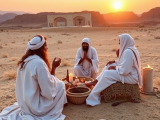Rest and Shalom: The Dual Blessings of Yehovah

By ADMIN

In a world that seems to be constantly moving, never pausing, never ceasing in its demands, the words of Yeshua in the book of Matthew offer a deep well of comfort and promise: “Come unto me, all ye that labour and are heavy laden, and I will give you rest” (Matthew 11:28, KJV). This invitation to “rest” is not just a call to physical relaxation, but to a deep, spiritual peace — a peace often encapsulated in the rich, Hebrew term “Shalom.”
Rest: A Divine Invitation
The notion of rest is deeply ingrained in the scriptures, woven into the fabric of creation itself. In the Genesis account, after six days of molding the cosmos into existence, Yehovah rested on the seventh day, sanctifying it (Genesis 2:2-3). This pattern was not just for Yehovah but set as a rhythm for mankind, to work and then to rest, as seen in the commandment to observe the Sabbath (Exodus 20:8-11).
The Hebrew word for this rest is “Shabbat,” a day set apart to cease from labor and to refocus on Yehovah, a day to remember the Creator and to rest in His provision and protection. It is a physical manifestation of trust, a relinquishing of control, a statement of belief that Yehovah is sovereign over all.
The Rest Yeshua Offers
Yeshua’s invitation to rest goes deeper than physical cessation of labor. It is an invitation to a rest that permeates every aspect of our being, a rest that is grounded in a relationship with Him. This is a rest from striving, from the burden of sin, and from the wearisome labor of self-righteousness.
The rest Yeshua offers is a rest of redemption, reminiscent of the rest Joshua provided to Israel when he led them into the Promised Land (Joshua 21:44). It is the fulfillment of the Sabbath rest, a peace not just for a day, but for eternity. The writer of Hebrews articulates this beautifully, encouraging believers to strive to enter that rest, to lay hold of the promises of Yehovah through faith in Yeshua (Hebrews 4:1-11).
Shalom: The Wholeness of Yehovah
As we delve deeper into the scriptures, we encounter another dimension of rest, expressed in the Hebrew word “Shalom.” This term, often translated as “peace,” carries a much broader meaning in Hebrew. It refers to a kind of wholeness, completeness, well-being, and harmony that encompasses every facet of life.
In the Hebrew Scriptures, we see Yehovah granting Shalom to His people. It is Yehovah who bestowed Shalom upon Job after his time of testing (Job 42:10). The Psalms are rich with prayers and blessings of Shalom, a recognition that true peace can only come from Yehovah (Psalm 29:11).
Yeshua: The Prince of Shalom
The prophet Isaiah speaks of the coming Messiah as the “Prince of Peace” (Isaiah 9:6), a ruler under whose governance Shalom would have no end. Yeshua embodies this prophecy perfectly. His life and teachings are a testament to the Shalom he brings into the lives of those who follow him. Yeshua’s Shalom is not as the world gives, it is a Shalom that transcends understanding, a Shalom that guards hearts and minds in the knowledge and love of Yehovah (John 14:27, Philippians 4:7).
Yeshua’s sacrifice on the cross, His bearing of our sins, and His resurrection from the dead, made the way for us to have Shalom with Yehovah, a reconciliation that was once impossible due to the chasm of sin (Romans 5:1).
Living in Shalom
As believers, we are called to live in this Shalom, to let the peace of Yeshua rule in our hearts (Colossians 3:15). This is not a passive experience but an active pursuit. The apostle Paul encourages believers to pursue peace with all people and to be sanctified, without which no one will see the Lord (Hebrews 12:14).
Living in Shalom means nurturing our relationship with Yehovah through prayer, meditation on the scriptures, and fellowship with other believers. It means walking in obedience to Yehovah’s commandments, for there is great peace for those who love His law (Psalm 119:165).
Extending Shalom to Others
Furthermore, we are called to be agents of Shalom in the world, to be peacemakers, as Yeshua stated in the Sermon on the Mount (Matthew 5:9). This means actively working towards reconciliation, justice, and wellbeing in our communities and in the world.
Yehovah’s vision for Shalom is beautifully portrayed in the prophetic words of Isaiah, where the restored creation is characterized by harmony, wellbeing, and the absence of harm or destruction (Isaiah 65:17-25). As believers, we are to be active participants in bringing this vision of Shalom to fruition, working hand in hand with Yehovah towards the restoration of all things.
Conclusion: Embracing the Fullness of Rest and Shalom
In conclusion, the scriptures paint a rich tapestry of the deep rest and Shalom that are found in Yehovah. From the creation narrative to the teachings of Yeshua, we are constantly invited to enter into this divine rest, a rest that rejuvenates, restores, and brings wholeness to every aspect of our being.
As we navigate the demands of life, may we continually heed Yeshua’s invitation to come unto Him for rest. May we embrace the Shalom that transcends all understanding, a Shalom that guards our hearts and minds, a Shalom that encompasses every facet of our lives.
Let us be a people characterized by rest and Shalom, living testimonies to the dual blessings of Yehovah, shining lights in a world in desperate need of both rest and Shalom. Let us strive, day by day, to enter that rest, to live in that Shalom, to be agents of Shalom in the world, until the day when Yehovah will make all things new, ushering in an eternity characterized by perfect rest and unending Shalom.










